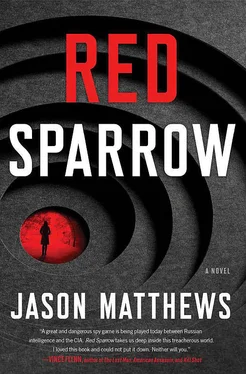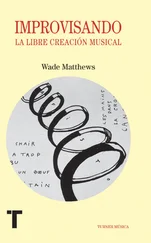“What is this?” said Boucher. “I asked you for something simple.”
“Be silent and I will explain,” snapped Golov. He wildly fantasized about extracting the needle again and plunging it into SWAN’s neck. He composed himself. “The needle is coated with a natural compound. It requires only that you break the skin, scratch yourself, anywhere, and it will take immediate effect. Ten seconds.” He held up his hand to silence her. “This is infinitely more effective than a pill. Please forget what you have seen in the movies. A pill can lose potency after a period of time; there is no problem with this.” He handed Boucher the pen. “Now you extract the needle,” he said, once again putting his hand on her wrist, “ very slowly and carefully .”
Boucher’s hands shook a little when she took the pen, hefted it in her hand, and pulled the pearl slowly and evenly, drawing it out of the clip. The little needle glinted dully, its menace somehow accentuated by its stubby length. Boucher carefully seated the needle back into the sheath and pushed the pearl home and locked. She turned to Golov, a bit chastened. “Thank you, Anatoly.” She clipped the Montblanc inside her blouse between the buttons and threw back the last of her wine.
The gravity of the moment now past, her eyes wandered around the room and settled on the four-poster bed and then on Golov. “Even remotely interested?” she asked to his infinite horror.
GOLOV’S MEDITERRANEAN CLAMS
Mix fresh oregano, lemon juice, panko bread crumbs, olive oil, and crumbled feta cheese with room-temperature butter to form a smooth compound butter. Roll and chill. Put a round of the butter on each opened clam in its shell resting on a bed of kosher salt. Broil until butter is melted, one to two minutes. Squeeze lemon juice over clams.
Rome was ocherroofs and lambent marble under the eternal sun. The bumblebee buzz of motorini hip-tilted through traffic by raven-haired girls in crocodile heels filled the air. General Korchnoi breathed it in. This was his old operational ground, and he remembered. He ordered lunch in rusty but elegant Italian. Dominika had never heard of spaghetti alla bottarga, but a bowl of pasta, glistening with oil and with a dusting of golden bottarga di muggine, roe of gray mullet, transported her. She looked over at Korchnoi, who nodded, pleased. It was nothing like Russian caviar, she thought.
They were sitting in La Taverna dei Fori Imperiale, two tiny rooms with cloth-covered tables and pastel murals on white stucco walls, floors of polished black and white tiles. The restaurant was halfway down Via Madonna dei Monti, a narrow, ancient street in the perpetual shadow of scuffed apartment buildings with ground-floor bakeries and woodshops, the air filled with the smells of baked bread and sawdust.
Dominika had the day before approached the COS and delivered her message, leaving the number of her throwaway phone. Korchnoi carefully observed Dominika before and after the contact—rock-solid and calm—and he approved. She was stimulated on the street, her cheeks were flushed, her wide eyes reflected the splash of a dozen dolphin fountains.
Korchnoi unilaterally changed the ops plan once they were away from Moscow. He had quietly insisted that they would initially connect with the Americans discreetly on the street, and then use a CIA-rented room for conversation.
“Forgive me, but I do not trust your uncle, or that Zyuganov,” Korchnoi told Dominika now as they strolled after lunch. They walked slowly past the Forum, over the sanpietrini cobblestones, and up a narrow walkway, looking for trailing coverage. They put a euro into a tin box and descended into the Mamertine Prison, imagining Saint Peter being lowered into the dungeon through the hole hewn into the rock of the Capitoline Hill. The prison unsettled the Russians and they left quickly, back up into the sunlight.
As they walked, stairstepping through neighborhoods, they used time over distance to ensure they weren’t covered in ticks. Korchnoi talked to her, sometimes stopping her to put a hand on her shoulder. He described the Life, of working for the CIA from within Russia, undetected inside the Service. They sat on a bench near an obelisk, spooning granitas, rich coffee ices, stealing looks at their watches, and pedestrians, and parked cars, as Korchnoi told her how a spy must know the difference between risk and recklessness, and about evaluating—but not necessarily accepting—the direction of your CIA handler. “It’s your life, your welfare,” Korchnoi said. “You ultimately decide what to do and how to do it.”
The Roman light freed her and she told Korchnoi more about Helsinki, about her activities, about how she felt with her secret, the sweet ice of it, she said, looking at the cone of frozen espresso in her hand. She spoke sparingly about Nate, for she did not know how he felt about her, or what she felt herself. Did he see her as an agent first, and a fleeting lover second? It was too hard, and Korchnoi saw it, knew it.
The general spoke of restraint, and calculation, and patience, the trinity that enabled him to survive for fourteen years as a CIA asset. It was unspoken that they would “work together,” but they did not try to define their partnership further. They knew agents seldom spied in tandem. Korchnoi did not speak at all about his vision of “succession” or of Dominika’s role as heir apparent.
What else they did not talk about—perhaps could not—was Russia and their sentiments about their country. This was boggy ground of betrayal and treason, and they left it alone. That would come later. Right now they just had enough time to finish the SDR and make it to the brief-encounter site and meet the Main Enemy.
=====
MARBLE had informed Langley via satellite burst that Dominika’s approach to COS Rome would signal their arrival in the city. That would trigger a meeting in twenty-four hours, ironically at a long-inactive KGB site in the Villa Borghese that MARBLE remembered from fifteen years ago. He had also transmitted a brief sentence— She passed, she’s ours now —indicating to Benford that Dominika had, in essence, been rerecruited by him. A most extraordinary situation. Two agents, each witting of the other, a single handler, the whole case directed by a mad scientist of a CI chief, two mole hunts—and the added necessity of having to decide where to eat dinner. This was Rome, after all, MARBLE thought.
Dominika’s cheap little phone trilled as they walked up a staircase to the northern limit of the Aurelian Walls, catching glimpses of blue-green trees and the biscuit-colored tiles and the golden domes. Korchnoi answered it in Italian and listened for ten seconds, then abruptly clacked the phone shut. “They’re in place. Would you like to take a stroll through the park?”
They walked in the heat of the Roman afternoon, through the Porta Pinciana and into the Villa Borghese. Korchnoi wore a light gray suit with a dark shirt, open at the neck, Dominika a navy skirt and a pink-and-blue-striped shirt. She wore her hair up against the heat. Together they looked like father and daughter, prosperous Romans, walking perhaps to visit the museum in the center of the park. Korchnoi could see she was excited and nervous, her blue eyes flashing. But he also saw her darting glances, checking for surveillance, cataloguing casuals.
Of course, Korchnoi knew the park. He had been assigned to the Rome rezidentura as a junior. He had met agents there, had left packages for assets in buried caches, his young wife watching for him. A lifetime ago. Now he and Dominika walked down the broad gravel avenues dappled by sunlight filtering through the plane trees. Korchnoi led Dominika past reflecting pools and paused at the perfect Fontana dei Cavalli Marini, with the rampant seahorses with cloven hooves. They walked around the hippodrome of the Piazza di Sienna and down the Viale del Lago. Korchnoi had seen no repeats, no indication of coverage, despite their serpentine route. Two minutes to the site. He felt rather than saw that Dominika was becoming nervous, was tightening up. Korchnoi slipped his arm in hers and told her a joke:
Читать дальше












